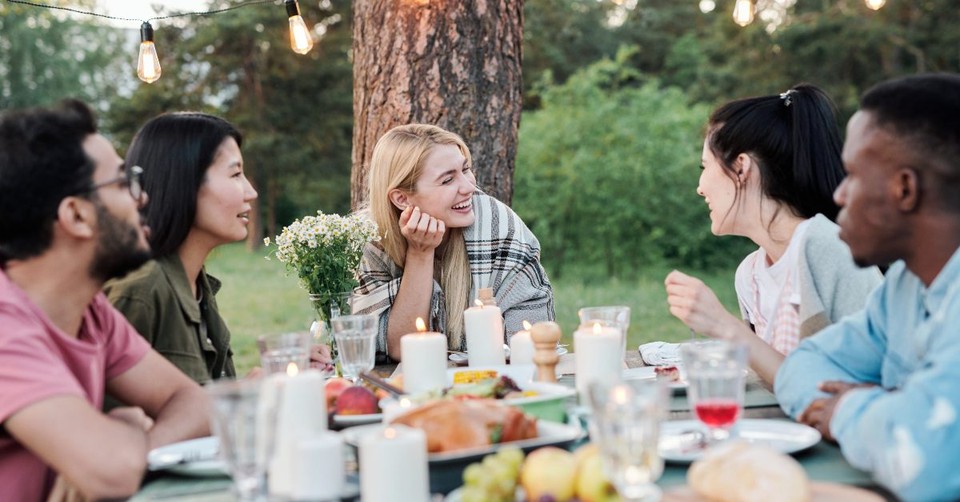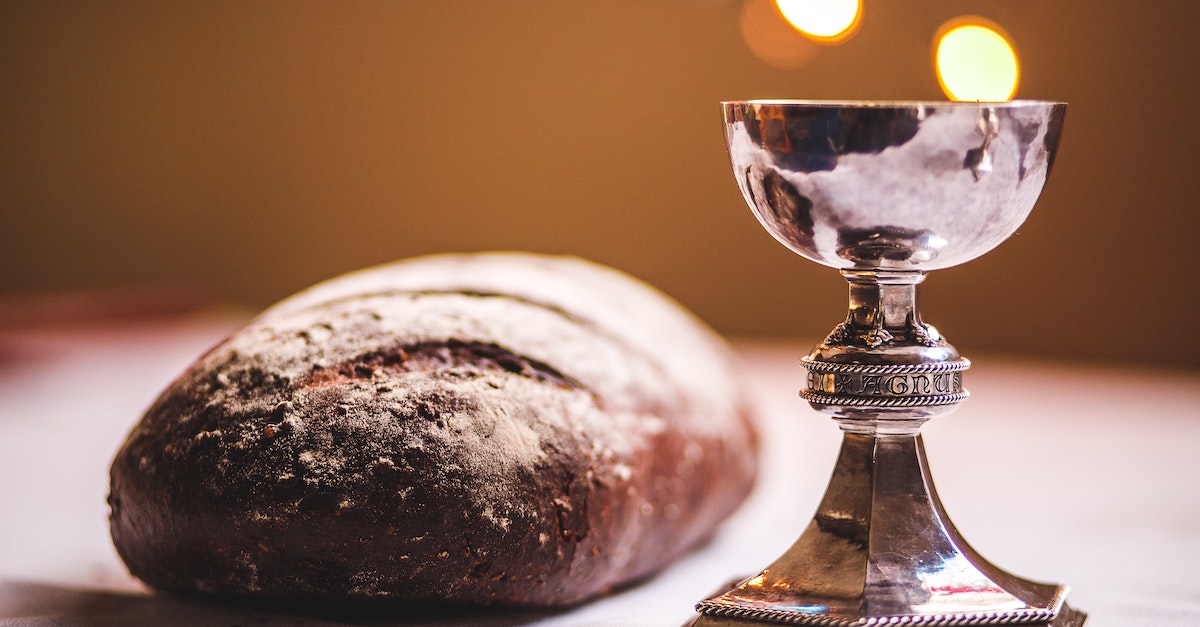What Is the Cultural Significance of Sharing a Meal?

God created us with hunger. A hunger for Him, a hunger for truth. A hunger for knowledge and, yes, a hunger for food. God blessed us with food to nourish our bodies, but He also created our need for sustenance with the community in mind. There is deep significance around preparing food and sharing a meal that we see revealed to us throughout Scripture. In the very beginning of Scripture, in Genesis, we see God referring to food as a blessing for His creation.
Then God said, "I give you every seed-bearing plant on the face of the whole earth and every tree that has fruit with seed in it. They will be yours for food." Gen 1:29
He created our bodies to need nourishment, but He designed eating to be so much more than that. Gathering around a table has a physical purpose but also creates a landscape of fellowship that we often won't find anywhere else.
He gives food to every creature. His love endures forever. Psalm 136:25
We read in Exodus 24 that God had created a covenant with His people. Moses presented this covenant to the people, and they wholeheartedly agreed to obey the Lord and His commands. They proceeded to offer their sacrifice, and afterward, Moses and the elders went up the mountain to commune with God and eat and drink. We see God values the table as it provides us an opportunity to connect, share, worship, and nourish our bodies.
Then Moses and Aaron, Nadab, and Abihu, and seventy of the elders of Israel went up, and they saw the God of Israel...And he did not lay his hand on the chief men of the people of Israel; they beheld God and ate and drank. Exodus 249-11
This continued in the Old Testament as festivals. The Lord encouraged His people to commemorate and celebrate all He had done for them. They were held at specific times throughout the year. God's people gathered around a table to feast, worship the Lord, and remember what He had done.
There was Passover, Unleavened Bread, First Fruits, Feast of Weeks, Feast of Triumphs, Day of Atonement, and Feast of Tabernacles. Each with its specific and important purpose.
We see in the New Testament that Jesus held this tradition in high esteem and proceeded to place a high significance on sharing a meal throughout His ministry. We often find Him reclining at a table, fellowshipping with His people, and building authentic relationships. He spent time with people, pouring into their lives and furthering His ministry. Jesus was often invited into homes, and He often accepted the invitations valuing the time spent at the table.
"Then Levi held a great banquet for Jesus at his house." Luke 5:29
"Now one of the Pharisees invited Jesus to have dinner with him." Luke 7:36

Before Jesus went to the cross, He chose to spend time with his disciples around a table, enjoying and sharing a meal. He could have spent His time any other way, but He chose fellowship and conversation with His beloved followers.
On the first day of the Festival of Unleavened Bread, the disciples came to Jesus and asked, "Where do you want us to make preparations for you to eat the Passover?" He replied, "Go into the city to a certain man and tell him, 'The Teacher says: My appointed time is near. I am going to celebrate the Passover with my disciples at your house.' Matthew 26:16
We see in Luke 22:19-20 that Jesus uses the "breaking of bread" to teach his disciples how to remember His sacrifice on the cross.
"And he took the bread, gave thanks and broke it, and gave it to them saying, this is my body given for you, do this in remembrance of me."
He then continued by using wine as a symbol of the blood that would soon be poured out on the cross.
"In the same way, after the supper he took the cup, saying "This cup is the new covenant in my blood, which is poured out for you."
Jesus knew that using bread and wine to symbolize and recognize His sacrifice would have significance to us as humans. It allows us to honor Him physically and remember what He did on the cross.
After the death and resurrection of Jesus, His followers, the early church, continued in Jesus' fashion to feast and fellowship together.
"Every day they continued to meet in the temple courts. They broke bread in their homes and ate together with glad and sincere hearts." Acts 2:46
Showing hospitality to others is a grand expression of the love of Jesus. He calls us to invite people in, walk down weary roads with them and not isolate ourselves. Inviting people into our homes and sitting around a prepared meal is a mighty act of love and service, drawing people into the love of Jesus.
Christians have always enjoyed sharing a meal because of the rich biblical symbolism; because it is a tangible expression of service, love, and unity; and because of the opportunity it affords for true fellowship and genuine community. Practically, sharing a meal nourishes our need to know and be known because it facilitates face-to-face conversation. - REV. David Camera
"Share with God's people who are in need. Practice hospitality." Romans 12:13
We can get caught up in the appearance or lack of space in our homes when it comes to hosting and showing hospitality to those we live life with. However, God calls us to be hospitable, invite people in, and share a meal. If you feel lacking, ask God to fill you with a desire to share your home, setting aside all excuses that tell you not to. Use this as an opportunity to share the love of Jesus, even if it is just through meal preparation and genuine conversation with people. Build authentic relationships and step into the mess of other people's lives. Perhaps, you will be the only Jesus they will ever meet.
"Do not forget to entertain strangers, for by doing so some people have entertained angels without knowing it. Hebrews 13:12
Sharing a meal has a deep significance throughout time and Scripture. We ought to enjoy the opportunities for sharing a meal and place high importance on spending time with others around a table. Make family dinners non-negotiable in your everyday life. There are obvious exceptions, but your children will notice if you maintain a routine. In our digitally driven world, these precious moments are rarer than ever. Take advantage of the time spent sharing a meal and asking about everyone's day. Share stories, and prayer requests, read devotionals, or listen to worship music. Create memories for your children that will last a lifetime. Give them a space to open up and know that they are loved.
God created us for community, and sharing a meal is His divine design to keep us coming back together. Invite someone over today. Give God your concerns, pray for creativity in the kitchen and bless others with the hospitality that is so important to God. He will certainly bless the time spent around the table, just as He has for thousands of years.
Heidi Vegh is a writer, speaker, and ministry leader living in Western Washington. She is a remarried mother of four, navigating the blended family life after the loss of her first husband to cancer in 2013. She longs to use her writing as a way to encourage others who have experienced loss and guide them on the road to healing. She contributes to her blog found at www.mrsheidivegh.com , sharing stories and devotionals of faith stemming from her loss and healing, mothering, and her blended and complex family. She graduated from Southern New Hampshire University with a degree in Creative Writing and English and is working on her first book. Heidi is the Women’s Ministry Director at her local church and has a deep heart for sharing Jesus with women and encouraging them in their faith walk. When she is not writing, she loves to travel, read, craft, and experiment in the kitchen. Visit her Facebook and Instagram (@mrsheidivegh) to learn more.
Originally published October 03, 2022.







